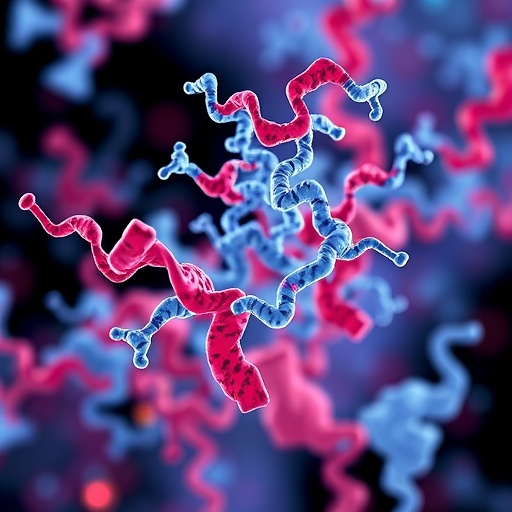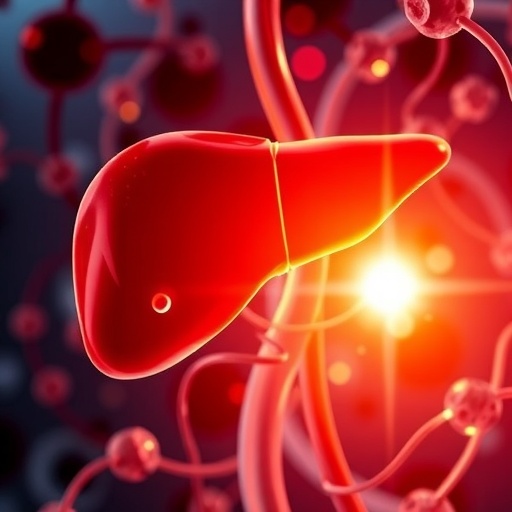PROTECT YOUR DNA WITH QUANTUM TECHNOLOGY
Orgo-Life the new way to the future Advertising by AdpathwayIn a groundbreaking study published in the Journal of Cancer Research and Clinical Oncology, researchers have unveiled a novel mechanism by which the FBXW11 protein exerts anti-tumor effects in hepatocarcinoma, a deadly form of liver cancer. The study, led by Liu, W., Xu, B., Wang, T., and colleagues, highlights the role of FBXW11 in the ubiquitination process of YB1, a protein that has been linked to cancer progression and poor prognosis in liver tumors. This intricate relationship between FBXW11 and YB1 underlines a potential therapeutic target that could lead to more effective strategies in fighting this malignancy.
FBXW11 belongs to the F-box protein family that plays crucial roles in the ubiquitin-proteasome pathway, a cellular mechanism that regulates the degradation of proteins, thereby controlling various cellular activities. The ubiquitin-proteasome system (UPS) is essential for maintaining cellular homeostasis and regulating various biological processes, including cell cycle progression, apoptosis, and response to stress. The findings suggest that FBXW11 serves as a muscle of regulation, specifically targeting YB1 for degradation, effectively reducing its levels within the cell and thus mitigating hepatocarcinogenic processes.
Hepatocellular carcinoma (HCC) is the most common type of primary liver cancer and ranks as the third leading cause of cancer-related deaths globally. The pathogenesis of HCC is multifaceted, often associated with chronic liver diseases such as hepatitis B and C infections, cirrhosis, and exposure to aflatoxins. Despite advancements in surgical and medical therapies, the prognosis remains poor for many patients due to late diagnosis and the aggressive nature of the disease. Thus, identifying the molecular pathways involved in hepatocellular carcinoma may provide insights into novel therapeutic strategies and improve patient outcomes.
The role of YB1 in cancer has garnered significant attention due to its multifunctional nature as a transcription factor and regulator of mRNA stability. It has been implicated in various malignancies, including breast, lung, and ovarian cancers, promoting tumorigenesis through mechanisms such as cell proliferation, invasion, and metastasis. The research led by Liu and his team reveals that elevated YB1 levels in HCC contribute to tumor cell growth and survival, thereby establishing it as a target for therapeutic intervention.
In their experiments, the researchers employed a combination of molecular biology techniques, including Western blotting and co-immunoprecipitation assays, to confirm the interaction between FBXW11 and YB1. The data demonstrated that FBXW11 facilitates the ubiquitination of YB1, which marks it for proteasomal degradation. This degradation process leads to a decrease in YB1 levels within hepatoma cells, subsequently inhibiting cell proliferation and inducing apoptosis, a form of programmed cell death essential for eliminating cancer cells.
Furthermore, in vivo studies using hepatocellular carcinoma mouse models illustrated the anti-tumor effects of FBXW11. The overexpression of FBXW11 in tumor cells resulted in substantial tumor regression, validating the therapeutic potential of leveraging this pathway. This finding encourages further exploration into targeting FBXW11 or enhancing its activity as a viable approach to suppress liver cancer growth.
Despite the promising findings, the study acknowledges the complexity of the tumor microenvironment and how it could influence the effectiveness of FBXW11 as a therapeutic target. The interaction between tumor cells and the surrounding stroma, including immune cells and extracellular matrix components, may pose challenges that need to be addressed in future research. Potential drug resistance mechanisms associated with targeted therapies also require careful consideration as the scientific community seeks to develop innovative cancer treatment strategies.
As researchers delve deeper into the mechanisms underlying liver cancer, it becomes increasingly important to connect the dots between fundamental biological processes and clinical applications. The relationship between FBXW11 and YB1 exemplifies how basic research can lead to significant progress in therapeutic strategies. The insights garnered from this work may pave the way for developing combination therapies that incorporate FBXW11 modulation alongside existing treatments, thereby improving prognosis for individuals afflicted with liver cancer.
In conclusion, the study authored by Liu, W., Xu, B., Wang, T., and their colleagues, illuminates a vital connection between FBXW11 and YB1 in the context of hepatocarcinoma. Their findings emphasize the potential of harnessing the ubiquitin-proteasome system to combat cancer, highlighting FBXW11 as a critical orchestrator in the regulation of YB1. These insights not only open doors for innovative therapeutic strategies in liver cancer treatment but also contribute significantly to the ongoing dialogue surrounding cancer biology and therapeutic development.
As researchers continue to pursue the intricate networks governing cancer biology, future studies will undoubtedly deepen our understanding of FBXW11’s role in other malignancies and its potential as a biomarker for prognosis or therapy response. The quest for effective cancer treatments remains an urgent endeavor, and studies like this one hold promise for the advancement of medical interventions that could save countless lives in the fight against cancer.
Subject of Research: The role of FBXW11 in inhibiting tumorigenesis by ubiquitinating YB1 in hepatocarcinoma.
Article Title: FBXW11 inhibits tumorigenesis by ubiquitinating YB1 in hepatocarcinoma.
Article References:
Liu, W., Xu, B., Wang, T. et al. FBXW11 inhibits tumorigenesis by ubiquitinating YB1 in hepatocarcinoma.
J Cancer Res Clin Oncol 151, 256 (2025). https://doi.org/10.1007/s00432-025-06307-6
Image Credits: AI Generated
DOI: https://doi.org/10.1007/s00432-025-06307-6
Keywords: hepatocellular carcinoma, FBXW11, YB1, ubiquitination, cancer research, proteasome, tumorigenesis.
Tags: anti-tumor effects of FBXW11apoptosis and cancer treatmentcancer progression and prognosiscellular homeostasis regulationFBXW11 protein functionhepatocarcinoma growth suppressionhepatocellular carcinoma research findingsliver cancer therapeutic targetsnovel cancer research breakthroughsprotein degradation in cancerubiquitin-proteasome pathway significanceYB1 ubiquitination mechanism


 4 hours ago
3
4 hours ago
3





















 English (US) ·
English (US) ·  French (CA) ·
French (CA) ·